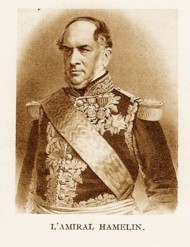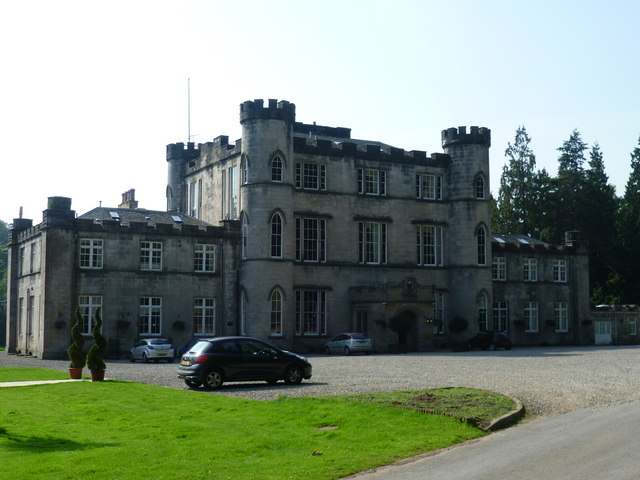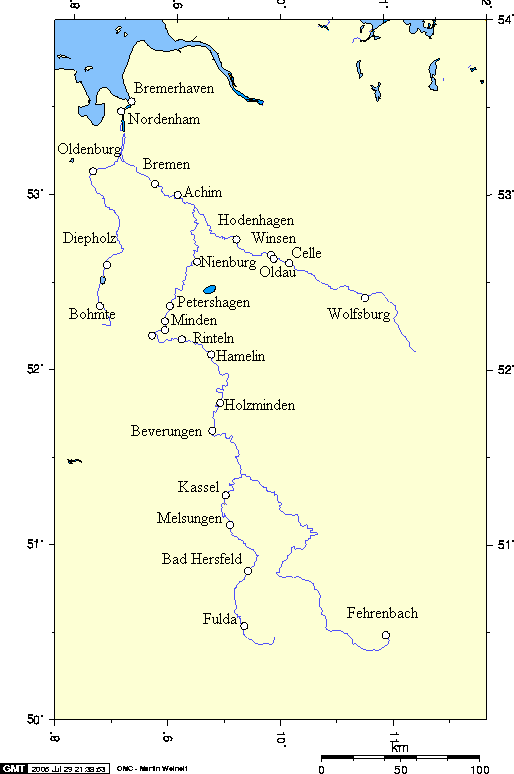|
François Alphonse Hamelin
Ferdinand-Alphonse Hamelin (2 September 1796 – 10 January 1864), French admiral, was born in Pont-l'Évêque, Normandy. He was the nephew of Jacques Félix Emmanuel Hamelin, a successful rear admiral in the French Navy of the Napoleonic era. Early career Hamelain went to sea in 1806 as cabin boy with his uncle, Jacques Félix Emmanuel Hamelin, on the frigate '' Vénus'' in the era of Napoleon and the French Empire. The ''Vénus'' was part of the French squadron in the Indian Ocean during the Mauritius Campaign of 1809-1811, and young Hamelin had an opportunity of seeing much active service. She, in company with another and a smaller vessel, captured the English frigate ''Ceylon'' in 1810, but was immediately afterwards captured herself by the '' Boadicea'', under Commodore Josias Rowley (1765–1842). Young Hamelin was a prisoner of war for a short time. His identification as François seems to be in error. Career after the First French Empire fell He returned to Franc ... [...More Info...] [...Related Items...] OR: [Wikipedia] [Google] [Baidu] |
Pont-l'Évêque, Calvados
Pont-l'Évêque () is a commune in the Calvados department in the Normandy region in northwestern France. It is known for Pont-l'Évêque cheese, a type of soft cheese, the oldest Normandy cheese in production. History In the summer of 1793, in the wake of the Montagnard seizure of power, the town called on neighboring villages to rise up against those who had imprisoned "the most ardent defenders of true liberty". The also blamed the Montagnard for the September massacres of the privious year. During World War II, the town was severely damaged by a two-day battle in August 1944. On 1 January 2019, the former commune of Coudray-Rabut was merged into Pont-l'Évêque. The town serves as the setting for Gustave Flaubert's story ''Un cœur simple'' and features heavily in the book ''13 - Lucky For Some'' which is about the history of the 13th (Lancashire) Parachute Battalion. There are many then and now photographs as well as maps and diagrams of battles that took place i ... [...More Info...] [...Related Items...] OR: [Wikipedia] [Google] [Baidu] |
Mauritius Campaign Of 1809-1811
Mauritius, officially the Republic of Mauritius, is an island country in the Indian Ocean, about off the southeastern coast of East Africa, east of Madagascar. It includes the main island (also called Mauritius), as well as Rodrigues, Agaléga, and St. Brandon (Cargados Carajos shoals). The islands of Mauritius and Rodrigues, along with nearby Réunion (a French overseas department), are part of the Mascarene Islands. The main island of Mauritius, where the population is concentrated, hosts the capital and largest city, Port Louis. The country spans and has an exclusive economic zone covering approximately . The 1502 Portuguese Cantino planisphere has led some historians to speculate that Arab sailors were the first to discover the uninhabited island around 975, naming it ''Dina Arobi''. Called ''Ilha do Cirne'' or ''Ilha do Cerne'' on early Cantino planisphere, Portuguese maps, the island was visited by Portuguese sailors in 1507. A Netherlands, Dutch fleet, under the comma ... [...More Info...] [...Related Items...] OR: [Wikipedia] [Google] [Baidu] |
Henry Dundas, 1st Viscount Melville
Henry Dundas, 1st Viscount Melville, PC, FRSE (28 April 1742 – 28 May 1811), styled as Lord Melville from 1802, was a British politician who served as Home Secretary from 1791 to 1794 and First Lord of the Admirality from 1804 to 1805. He was instrumental in the encouragement of the Scottish Enlightenment, in the prosecution of the war against France, and in the expansion of British influence in India. Prime Minister William Pitt appointed him Lord of Trade (1784–1786), Home Secretary (1791–1794), President of the Board of Control for Indian Affairs (1793–1801), Secretary at War (1794–1801) and First Lord of the Admiralty (1804–1805). As a political boss, Dundas's deft and almost absolute power over Scottish politics during a long period in which no monarch visited the country led to him being nicknamed "King Harry the Ninth", the "Grand Manager of Scotland" (a play on the masonic office of Grand Master of Scotland), and "The Uncrowned King of Scotland. ... [...More Info...] [...Related Items...] OR: [Wikipedia] [Google] [Baidu] |
Black Sea
The Black Sea is a marginal sea, marginal Mediterranean sea (oceanography), mediterranean sea lying between Europe and Asia, east of the Balkans, south of the East European Plain, west of the Caucasus, and north of Anatolia. It is bounded by Bulgaria, Georgia (country), Georgia, Romania, Russia, Turkey, and Ukraine. The Black Sea is Inflow (hydrology), supplied by major rivers, principally the Danube, Dnieper and Dniester. Consequently, while six countries have a coastline on the sea, its drainage basin includes parts of 24 countries in Europe. The Black Sea, not including the Sea of Azov, covers , has a maximum depth of , and a volume of . Most of its coasts ascend rapidly. These rises are the Pontic Mountains to the south, bar the southwest-facing peninsulas, the Caucasus Mountains to the east, and the Crimean Mountains to the mid-north. In the west, the coast is generally small floodplains below foothills such as the Strandzha; Cape Emine, a dwindling of the east end ... [...More Info...] [...Related Items...] OR: [Wikipedia] [Google] [Baidu] |
Marquesas Islands
The Marquesas Islands ( ; or ' or ' ; Marquesan language, Marquesan: ' (North Marquesan language, North Marquesan) and ' (South Marquesan language, South Marquesan), both meaning "the land of men") are a group of volcano, volcanic islands in French Polynesia, an overseas collectivity of France in the southern Pacific Ocean. Their highest point is the peak of Mont Oave, Mount Oave () on Ua Pou island, at 1,230 m (4,035 ft) above sea level. Archaeological research suggests the islands were colonized in the 10th century AD by voyagers from West Polynesia. Over the centuries that followed, the islands have maintained a "remarkably uniform culture, biology and language". The Marquesas were named after the 16th-century Spanish Viceroy of Peru, the García Hurtado de Mendoza, 5th Marquis of Cañete, Marquis of Cañete (), by navigator , who visited them in 1595. The Marquesas Islands constitute one of the administrative divisions of French Polynesia, five administrative di ... [...More Info...] [...Related Items...] OR: [Wikipedia] [Google] [Baidu] |
Algiers
Algiers is the capital city of Algeria as well as the capital of the Algiers Province; it extends over many Communes of Algeria, communes without having its own separate governing body. With 2,988,145 residents in 2008Census 14 April 2008: Office National des Statistiques de l'Algérie (web). and an estimated 3,004,130 residents in 2025 in an area of , Algiers is the largest city in List of cities in Algeria, Algeria, List of coastal settlements of the Mediterranean Sea, the third largest city on the Mediterranean, List of largest cities in the Arab world, sixth in the Arab World, and List of cities in Africa by population, 11th in Africa. Located in the north-central portion of the country, it extends along the Bay of Algiers surrounded by the Mitidja Plain and major mountain ranges. Its favorable location made it the center of Regency of Algiers, Ottoman and French Algeria, French cultural, political, and architectural influences for the region, shaping it to be the diverse met ... [...More Info...] [...Related Items...] OR: [Wikipedia] [Google] [Baidu] |
Spain
Spain, or the Kingdom of Spain, is a country in Southern Europe, Southern and Western Europe with territories in North Africa. Featuring the Punta de Tarifa, southernmost point of continental Europe, it is the largest country in Southern Europe and the fourth-most populous European Union member state. Spanning across the majority of the Iberian Peninsula, its territory also includes the Canary Islands, in the Eastern Atlantic Ocean, the Balearic Islands, in the Western Mediterranean Sea, and the Autonomous communities of Spain#Autonomous cities, autonomous cities of Ceuta and Melilla, in mainland Africa. Peninsular Spain is bordered to the north by France, Andorra, and the Bay of Biscay; to the east and south by the Mediterranean Sea and Gibraltar; and to the west by Portugal and the Atlantic Ocean. Spain's capital and List of largest cities in Spain, largest city is Madrid, and other major List of metropolitan areas in Spain, urban areas include Barcelona, Valencia, Seville, ... [...More Info...] [...Related Items...] OR: [Wikipedia] [Google] [Baidu] |
Duke Of Angoulême
Duke is a male title either of a monarch ruling over a duchy, or of a member of royalty, or nobility. As rulers, dukes are ranked below emperors, kings, grand princes, grand dukes, and above sovereign princes. As royalty or nobility, they are ranked below grand dukes and above or below princes, depending on the country or specific title. The title comes from French ''duc'', itself from the Latin '' dux'', 'leader', a term used in republican Rome to refer to a military commander without an official rank (particularly one of Germanic or Celtic origin), and later coming to mean the leading military commander of a province. In most countries, the word ''duchess'' is the female equivalent. Following the reforms of the emperor Diocletian (which separated the civilian and military administrations of the Roman provinces), a ''dux'' became the military commander in each province. The title ''dux'', Hellenised to ''doux'', survived in the Eastern Roman Empire where it continued in se ... [...More Info...] [...Related Items...] OR: [Wikipedia] [Google] [Baidu] |
Napoleon
Napoleon Bonaparte (born Napoleone di Buonaparte; 15 August 1769 – 5 May 1821), later known by his regnal name Napoleon I, was a French general and statesman who rose to prominence during the French Revolution and led Military career of Napoleon, a series of military campaigns across Europe during the French Revolutionary and Napoleonic Wars from 1796 to 1815. He led the French First Republic, French Republic as French Consulate, First Consul from 1799 to 1804, then ruled the First French Empire, French Empire as Emperor of the French from 1804 to 1814, and briefly again in 1815. He was King of Italy, King of Kingdom of Italy (Napoleonic), Italy from 1805 to 1814 and Protector of the Confederation of the Rhine, Protector of the Confederation of the Rhine from 1806 to 1813. Born on the island of Corsica to a family of Italian origin, Napoleon moved to mainland France in 1779 and was commissioned as an officer in the French Royal Army in 1785. He supported the French Rev ... [...More Info...] [...Related Items...] OR: [Wikipedia] [Google] [Baidu] |
Hamelin Portrait
Hameln ( ; ) is a town on the river Weser in Lower Saxony, Germany. It is the capital of the district of Hameln-Pyrmont and has a population of roughly 57,000. Hamelin is best known for the tale of the Pied Piper of Hamelin. History Hameln started with a monastery, which was founded as early as 851 AD; its surrounding village became a town by the 12th century. The incident involving the "Pied Piper" (see below) is said to have occurred in 1284 and may be based on a true event, although somewhat different from the traditional tale. In the 15th and 16th centuries, Hamelin was a minor member of the Hanseatic League. In June 1634, during the Thirty Years' War, Lothar Dietrich, Freiherr of Bönninghausen, a general in the Imperial Army of the Holy Roman Emperor, lost the Battle of Oldendorf to the Swedish General Kniphausen, after Hamelin had been besieged by the Swedish army. The era of the town's greatest prosperity began in 1664, when Hamelin became a fortified border town of ... [...More Info...] [...Related Items...] OR: [Wikipedia] [Google] [Baidu] |
Prisoner Of War
A prisoner of war (POW) is a person held captive by a belligerent power during or immediately after an armed conflict. The earliest recorded usage of the phrase "prisoner of war" dates back to 1610. Belligerents hold prisoners of war for a range of legitimate and illegitimate reasons. These may include isolating them from enemy combatants still in the field (releasing and Repatriation, repatriating them in an orderly manner after hostilities), demonstrating military victory, punishment, prosecution of war crimes, labour exploitation, recruiting or even conscripting them as combatants, extracting collecting military and political intelligence, and political or religious indoctrination. Ancient times For much of history, prisoners of war would often be slaughtered or enslaved. Early Roman gladiators could be prisoners of war, categorised according to their ethnic roots as Samnites, Thracians, and Gauls (''Galli''). Homer's ''Iliad'' describes Trojan and Greek soldiers offeri ... [...More Info...] [...Related Items...] OR: [Wikipedia] [Google] [Baidu] |
Josias Rowley
Admiral Sir Josias Rowley, 1st Baronet, (1765 – 10 January 1842) was a Royal Navy officer and politician who served in the French Revolutionary and Napoleonic Wars. Birth and family Rowley was born in 1765 the second son of Clotworthy Rowley and Letitia (née Campbell), of Mountcampbell, Drumsna, County Leitrim, in the West of Ireland. His father was a Barrister and MP for Downpatrick in the Irish Parliament. His paternal grandfather was Admiral of the Fleet Sir William Rowley, KCB. He had at least one brother William, MP for Kinsale and Recorder of Kinsale. Naval career He joined the Royal Navy in 1778, age 13, on HMS ''Suffolk'' in the West Indies, under the command of his uncle, Sir Joshua Rowley. Promoted to post captain in 1795, age 30, he commanded HMS ''Braave'' (40 guns) at the Cape of Good Hope and then (38 guns) in the East Indies. He also commanded (64 guns) and took part in the Battle of Cape Finisterre in 1805. In 1798 he became the Member of the Irish ... [...More Info...] [...Related Items...] OR: [Wikipedia] [Google] [Baidu] |






